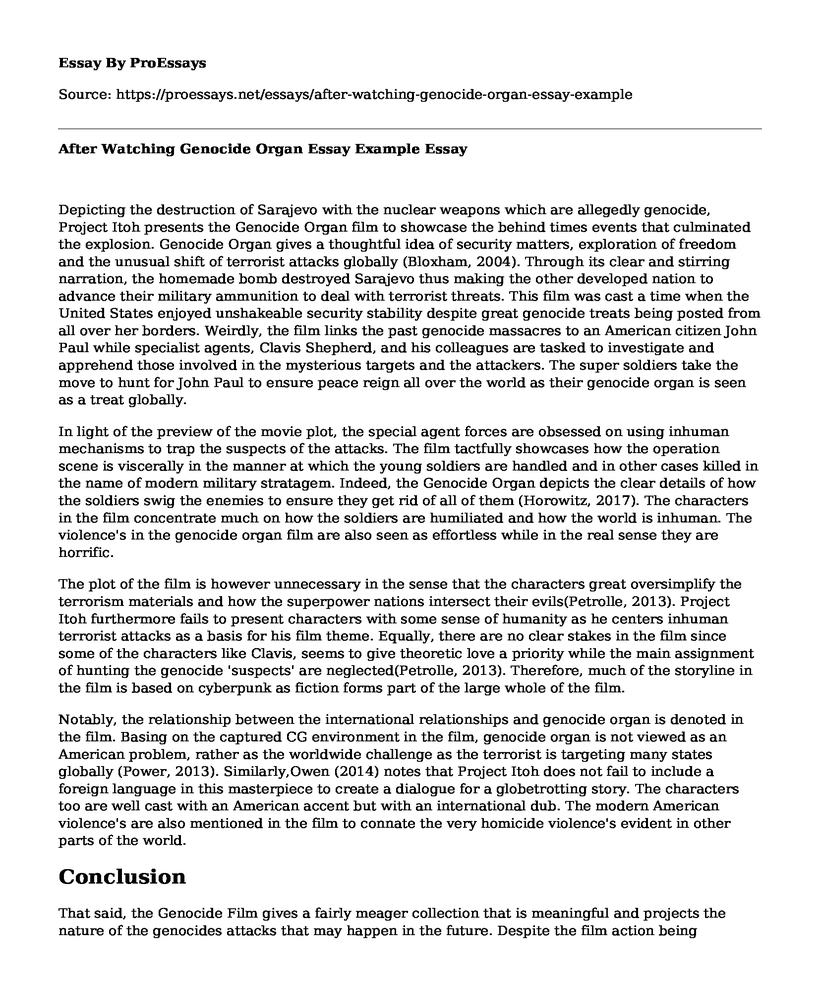Depicting the destruction of Sarajevo with the nuclear weapons which are allegedly genocide, Project Itoh presents the Genocide Organ film to showcase the behind times events that culminated the explosion. Genocide Organ gives a thoughtful idea of security matters, exploration of freedom and the unusual shift of terrorist attacks globally (Bloxham, 2004). Through its clear and stirring narration, the homemade bomb destroyed Sarajevo thus making the other developed nation to advance their military ammunition to deal with terrorist threats. This film was cast a time when the United States enjoyed unshakeable security stability despite great genocide treats being posted from all over her borders. Weirdly, the film links the past genocide massacres to an American citizen John Paul while specialist agents, Clavis Shepherd, and his colleagues are tasked to investigate and apprehend those involved in the mysterious targets and the attackers. The super soldiers take the move to hunt for John Paul to ensure peace reign all over the world as their genocide organ is seen as a treat globally.
In light of the preview of the movie plot, the special agent forces are obsessed on using inhuman mechanisms to trap the suspects of the attacks. The film tactfully showcases how the operation scene is viscerally in the manner at which the young soldiers are handled and in other cases killed in the name of modern military stratagem. Indeed, the Genocide Organ depicts the clear details of how the soldiers swig the enemies to ensure they get rid of all of them (Horowitz, 2017). The characters in the film concentrate much on how the soldiers are humiliated and how the world is inhuman. The violence's in the genocide organ film are also seen as effortless while in the real sense they are horrific.
The plot of the film is however unnecessary in the sense that the characters great oversimplify the terrorism materials and how the superpower nations intersect their evils(Petrolle, 2013). Project Itoh furthermore fails to present characters with some sense of humanity as he centers inhuman terrorist attacks as a basis for his film theme. Equally, there are no clear stakes in the film since some of the characters like Clavis, seems to give theoretic love a priority while the main assignment of hunting the genocide 'suspects' are neglected(Petrolle, 2013). Therefore, much of the storyline in the film is based on cyberpunk as fiction forms part of the large whole of the film.
Notably, the relationship between the international relationships and genocide organ is denoted in the film. Basing on the captured CG environment in the film, genocide organ is not viewed as an American problem, rather as the worldwide challenge as the terrorist is targeting many states globally (Power, 2013). Similarly,Owen (2014) notes that Project Itoh does not fail to include a foreign language in this masterpiece to create a dialogue for a globetrotting story. The characters too are well cast with an American accent but with an international dub. The modern American violence's are also mentioned in the film to connate the very homicide violence's evident in other parts of the world.
Conclusion
That said, the Genocide Film gives a fairly meager collection that is meaningful and projects the nature of the genocides attacks that may happen in the future. Despite the film action being glamorous, the dramatic intents are keenly laid perfectly with a more controlled movement. Hence the film recommends the need for an immediate, powerful mission to combat the modern brutality and human violence's.
References
Bloxham, D. (2004). The Genocidal Past in Western Germany and the Experience of Occupation, 1945-6. European History Quarterly, 34(3), 305-335.
Horowitz, I. L. (2017). Taking Lives: Genocide and state power. Routledge.
Owen, T. (2014). Human security-Conflict, critique, and consensus: colloquium remarks and a proposal for a threshold-based definition. Security Dialogue, 35(3), 373-387.
Petrolle, J. (2013). A Review of "Framing the World: Explorations in Ecocriticism and Film: edited by Paula Willoquet-Maricondi. Charlottesville and London: University of Virginia Press, 2010.
Power, S. (2013). " A Problem from Hell": America and the Age of Genocide. Basic Books.
Cite this page
After Watching Genocide Organ Essay Example. (2022, Nov 06). Retrieved from https://proessays.net/essays/after-watching-genocide-organ-essay-example
If you are the original author of this essay and no longer wish to have it published on the ProEssays website, please click below to request its removal:
- Paranormal Activity and Schindler's List Movies Essay
- Comparison Between Julius Caesar and Abraham Lincoln Essay
- Analysis of Dawson Change in A Few Good Men Film - Essay Sample
- Essay Sample on 2000 Presidential Election
- Movie Analysis Essay on Titanic
- Essay Example on Transformations in Accessing Knowledge: Social Media's Impact
- Essay Example on Healthcare Risk Management: Maximizing Quality & Compliance







